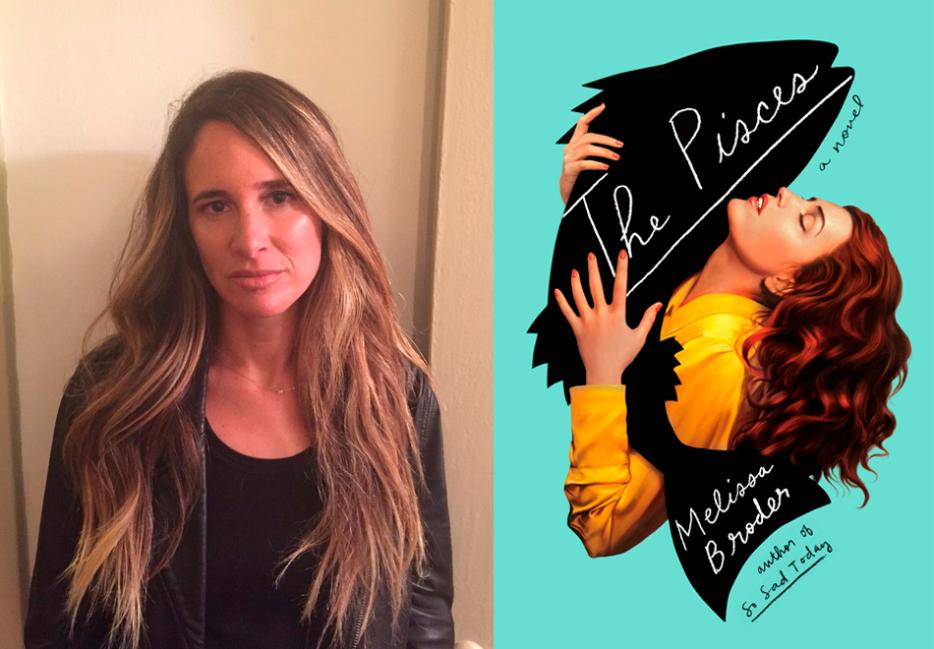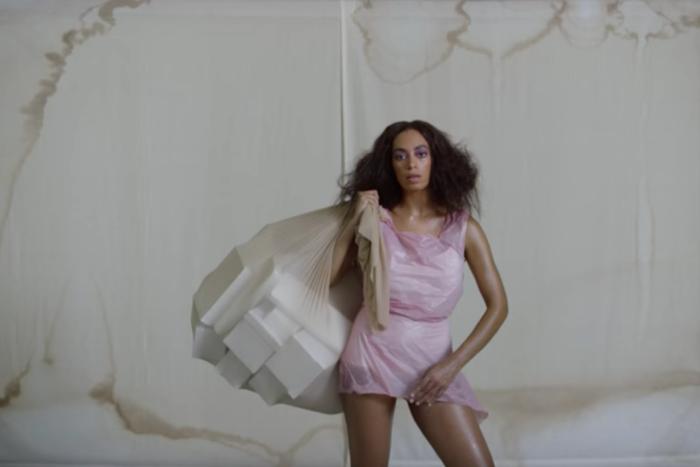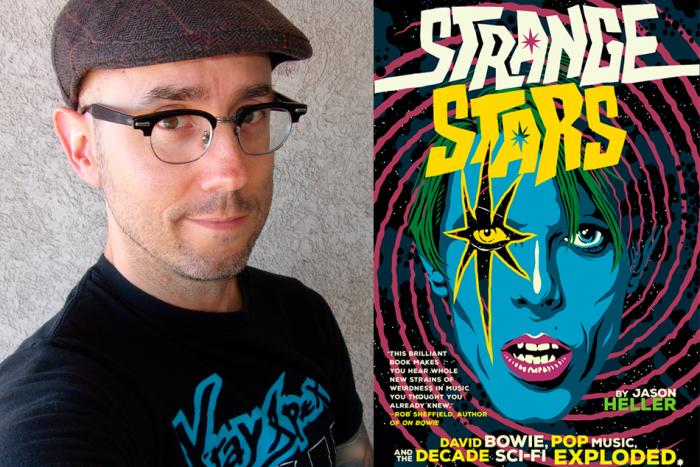How do you fill an existential void—carved out by anxiety, depression, a general sense of malaise—within yourself? Everyone has their fixes: food, drugs, alcohol, sex, mindless scrolling through Instagram, obsessively checking your horoscope, a dogged exercise regime, drunk texting an ex.
This question is fundamental to Los Angeles-based author Melissa Broder’s new book, The Pisces (Hogarth). In it, PhD student Lucy has been writing her dissertation on the Greek poet Sappho for nine years when she inadvertently breaks up with her longtime boyfriend in a failed attempt to get him to commit. Newly single, depressed and under pressure to finish her thesis, Lucy moves to Venice Beach to dogsit for her half-sister over the summer. In Los Angeles, Lucy fills her voids with one-off Tinder dates and crappy sex in fancy hotel lobby bathrooms. Then she meets Theo, a young, bronzed swimmer who actually turns out to be a merman, and falls obsessively in love with him.
Broder has written four books of poetry and is the person behind the viral Twitter account, @SoSadToday, where she posts dark and funny ruminations like, “autocorrect ‘weekend’ to ‘sitting alone in the dark’” and “should I eat, nap or masturbate: the musical.” In 2016, her Twitter spawned the essay collection, So Sad Today, in which she writes in unflinching detail about her own experiences with depression, anxiety and romantic doom.
When I call Broder a week before The Pisces comes out, she’s channeling her own anxiety by eating miniature cheesecakes while sitting behind the wheel of her car stationed in the grocery store parking lot and buying the same pair of shoes and then returning them over and over again. We talked about the big business of self-care and wellness, why she has a love-hate relationship with astrology, The Shape of Water and fish sex.
Samantha Edwards: When did you start thinking about The Pisces?
Melissa Broder: After I finished writing So Sad Today, I still really wanted to explore this theme of love as addiction and why fantasy love can be so much more intoxicating than earthly love. I was on the beach in Venice, where I was living at the time, and reading this book called The Professor and the Siren by a dead Italian writer, Giuseppe Tomasi di Lampedusa. It’s about a man who falls in love with a mermaid. It dawned on me how much the human-mermaid relationship really embodies this dichotomy that I was trying to explore. But why is it always a mermaid and a man? Why is it never a merman and a woman? The story was born for me right there.
I don’t write often from a personal standpoint, so I’ve always imagined that it’s harder to write personal essays because you need to put yourself out into the world. It’s feels more vulnerable. Is it harder to write as yourself than as Lucy?
I wouldn’t say it’s easier. There’s a lot of me in Lucy, as there always is some of yourself in your characters. I feel really fondly for Lucy. She’s become a companion of mine. I never understood when fiction writers talked about their characters as people. I thought, “you’re fucking weird.” Now I’m writing the screenplay of The Pisces and it’s so fun because I get to be back in this world. It’s almost like writing fan-fic.
How do you see yourself in Lucy?
We’re both really sad and don’t understand why fantasy isn’t reality. We’re both perplexed that you can’t just will life to be as you imagine it to be. We also both have addictive tendencies. I have a broader range of addictions than Lucy. Lucy can sometimes get a little too drunk, but it’s fine. I cannot just have “some” white wine. I’ve been sober for thirteen years. But I think when it comes to sex and love, Lucy’s journey is very much one that I have. I have not fucked a merman, but I definitely grappled with the question of, “Can you fill the existential hole with romantic obsession?”
I wanted to ask you about holes. In The Pisces you write a lot about filling holes, whether they’re literal, like mouths, vaginas or assholes, or cosmic and existential. In the first essay in So Sad Today, you write about being a baby and needing so much breast milk from your mom so you could sate a hole. What do holes in all their varying forms mean to you?
I think the awareness of feeling like something is missing or that there’s an emptiness within has dictated a lot of choices I’ve made in my life. I tried to use a lot of different things to sate those holes. Through experience I’ve come to realize that there’s no amount of validation, drugs, alcohol, food, success or the right pair of shoes that’s going to be that lasting caulk. It’s really an inside job.
That being said, I’m a human being and I’m always going to reach for shiny shit. I’m probably always going to try to fill that internal hole with outside stuff. I’m not expecting to reach any sort of enlightenment where I come to peace with my own emptiness all the time. But I do continue to come back around to this place where I’m like right, it’s an inside job and the solution is spiritual. I’m probably always going to continue to have these awakenings and mistakes, but for me, that feeling—whether you want to call it depression or an existential hole—has been a real, powerful force. It’s something that I’m very aware of so it infuses everything I write.
How old were you when you first had that awareness?
I always say that I could have probably used a drink right out of the womb. I’ve never been that chill about being alive. [I’ve had this awareness] from a very young age, but I do have some very visceral memories.
I have a memory of being on a beach when I was probably around twelve. That’s when I was very familiar with my holes. I had so many crushes at that point. My longing for boys was off the charts. But I remember sitting on a beach and seeing all these beautiful other girls around me and they were all wearing bikinis and I was not having a good time with my body, it was very Are You There God? It’s Me, Margaret. The sun was beating down and I remember the level of discomfort and darkness that I was feeling. I just thought god, I wish I could be one of them.
Another one, aged 12, was hooking up with—okay, I’ll change his name, I don’t want to give his real name—hooking up with “Josh Goldberg” in the phone room in a hotel at a bat mitzvah. We were slow dancing to this song by the Righteous Brothers and then we made out and it was so amazing, and then the next day being like, “I wonder if I’ll ever hear from him?” For a moment, that hole had been filled and then on the other side of the filling of that hole, what it had done is expanded the hole and oh my god, I’m hungrier than ever.
Lucy is in group therapy with a woman she calls “Chickenhorse” who constantly talks about being trigged by seemingly innocuous stuff, like newsboy caps. In one session she says she feels “re-traumatized” because her mom doesn’t like her dogs.
And she’s always the victim.
“Trigger warnings” are so present in our vernacular in 2018 and how we preface stories, and I get the importance of that. And while I did feel sympathy for Chickenhorse, I also found her really annoying in how she always made herself the victim.
That’s the thing. I have compassion for Chickenhorse’s suffering, but her constant use of the same words to sort of signify that suffering makes it hard to connect. It’s the McDonaldization of suffering. As someone who really cares a lot about language, Lucy is just like, “Why are they using all the same words?” Psychobabble can be a turn-off.
What do you think about self-care as this…
The self-care industrial complex?
Yeah, this idea that it’s something that you can buy. The big business of self-care and wellness.
When I was in my early twenties I was really into New Age culture. I also was doing a lot of psychedelics and smoking a lot of weed. I worked at at a tantric sex and wellness non-profit in the Bay area. I saw the business side and I think it really clued me into the performative elements of the business. And I’ve always been skeptical of any modality that purports itself to be “the only way”, especially if there’s a lot of money being made.
That being said, I don’t think there’s anything inherently wrong with the monetization of learning a new meditation modality or being a healer. I get really skeptical when some humans claim that they have a patent on the truth.
How did working at the tantric sex wellness place affect your views on self-wellness?
It showed me that anything can be snake oil. I think that as a person who always had insecurities, I was always looking outside of myself for the answer. I really thought any psychic, astrologist or tarot card reader knew more than I did. When I was nineteen I went through a breakup very similar to Lucy’s breakup, and I studied astrology as a way of attempting to manipulate the universe into bringing me love. I’ve kind of given up on astrology in a lot of ways. I think it’s a very reductive way to look at the universe. But I’m also like that person who is a lax Catholic, yet still secretly believes in hell. For me, it’s like ah, astrology is bullshit, but I’m never going to fuck an Aries.
In The Pisces, Lucy reads her horoscopes from like five different sources until she finds one that she likes. I think a lot of people, myself included, read our horoscopes in that way. Like if I don’t like what Astro Poets on Twitter or astrology.com tell me, I’ll go some place else until I find a horoscope I think is relevant to me and what’s happening in my life.
I don’t read my horoscopes anymore, but within like ten minutes of meeting someone, I’m always like, when’s your birthday? It’s like a tic of mine. I see astrology as more like archetypes now. It’s symbolism and as a poet I can totally get with that. We’ve all accidentally read the wrong horoscope and thought it really applied to us, like oh wait, they were describing Sagittarius, but I’m a Virgo and it sounds so much like me. We all want to make sense of the world.
There have been some think pieces recently about how mermaids and mermen are having “a moment.” I know everyone probably asks you this, but have you seen The Shape of Water yet?
I haven’t, but I was on an airplane and The Shape of Water was one of the movie choices so I put it on and fast-forwarded through it. I just wanted to find the fish sex, but I couldn’t find it so I just turned it off.
When you heard about the premise of The Shape of Water, were you like, oh my god, there’s something else coming out with fish sex going on?
I was like, I’m so fucked. I didn’t hear about it until it was already out. And then when it won an Oscar I was like, no one is going to read my book. But then my agent was like no, it’s good, people will be prime for fish sex. [In The Shape of Water], isn’t he a weird slimy creature? He’s not a merman.
I’d say he’s definitely more fish.
Yeah, he’s gross. He looks like an amphibian.
Yes, very amphibious. He’s also kind of buff, but definitely not sexy. Why do you think people are attracted to this idea of finding love in these creatures?
On the planet right now, everyone has all the answers. We have access to information at the tip of our finger tips; there are so many think pieces telling us what to think and what to believe. The ocean is still this totally mysterious realm. When you think about all the dating apps, we know so much information about people before we even meet them. With the ocean, it’s the opposite.






